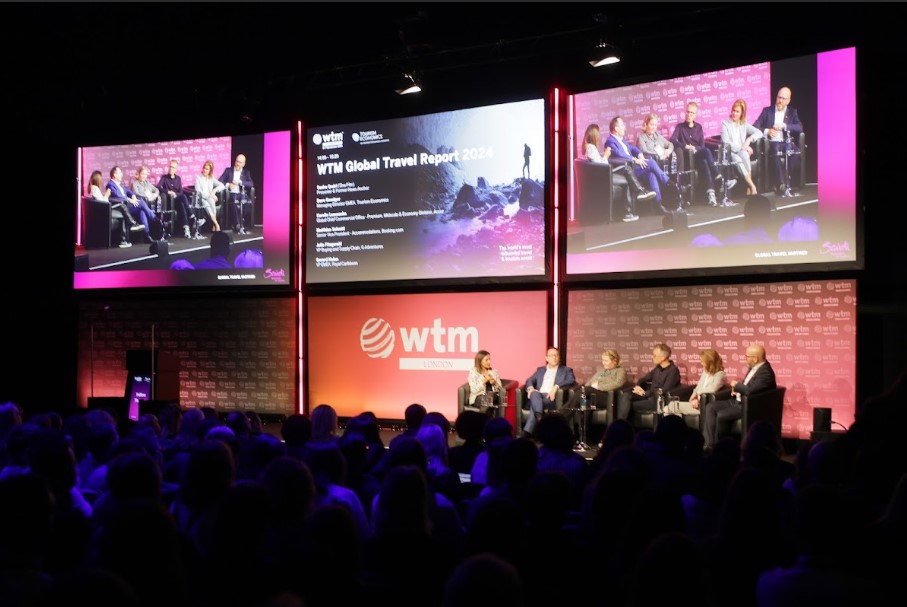The inbuilt complexity of the airline industry means that meeting the traveller demand for frictionless travel requires innovation from technology providers and support from the C-suite, according to industry execs speaking at World Travel Market London today.
The Technology Track, organised and moderated by Timothy O’Neil-Dunne from T2Impact and sponsored by trip.com Group, featured a dozen or so speakers and panellists from different geographies discussing “the frictionless future of travel”.
Mark Lenahan, Head of Retailing Strategy, Travelport, started the sessions by sharing the feedback he’s received from customer focus groups over the years. He noted that travellers from different source markets have a different point of reference when it comes to their favourite e-commerce brands – outside of travel – to do business with. “But when I asked why, the answer is always the same,” he said, “Customers want things to be easy.”
But in travel, he continued, we make things complicated. He identified two degrees of complexity: necessary complexity – government and regulatory requirements – and self-inflicted complexity – millions of fares, over-complicated product catalogues, too many booking categories.
Ian Tunnacliffe from T2RL expanded on this, adding in “the laws of physics” as another layer of complexity that technology providers have to consider, defining this as components of the aviation industry that are never going to go away.
“Comparing the airline industry to Amazon is like chalk and cheese,” he explained. “But it’s not the technology that makes the industry complicated, it’s the underlying business processes that we need to rationalise.”
The specific question about whether technology or processes are causing the complexity problems which lead to friction was a recurring theme. Lenahan used the example of how banking has changed for the better over the years as a result of digitisation, a point that was expanded upon in a session featuring execs from payment providers.
James Lennon from Stripe noted how the payments industry has changed significantly over the past ten years, and that payments are now, or should be, as important as marketing and loyalty. Ease of payment is a prerequisite to frictionless travel, but a customer-centric payment process also inspires trust and positive word-of-mouth.
He added that online travel is a highly competitive space and that if a customer is nervous around the security of the payments page, or if the site does not accept the customer’s payment method of choice, “there are tons of other travel companies out there who will.”
Lennon told sellers and suppliers that earning the trust of travellers meant more of them are likely to take up the flexible options which today’s payment technology offered, such as buy now pay later, pay by installment or through a plan. He noted that these options had a positive impact on conversion rates and basket value.
On the same panel, Will Plummer, CEO & Co-Founder, Trust My Group, noted that “payments are often seen as the end of the funnel but trust in payments starts when the customer arrives at your web site”.
Frictionlessness and trust are all essential aspects of any online travel business, but businesses need senior execs to see the value of investing in the technology to deliver these foundational principles.
Keynote speaker Boon Sian Chai, Managing Director and Vice President, International Markets, Trip.com Group, shared with attendees the story of its highly successful Live Streaming product for the Chinese audience, the brainchild of the group’s co-founder and CEO James Liang.
With C-suite buy-in baked in at source to this innovation, the group has now opened a dedicated centre in Bangkok to roll out Live Streaming to Asia-Pacific source markets.
Customer-centricity, like frictionlessness and trust, are global considerations for travel brands, as evidenced by an around-the-world session which drew on the experience of regional OTAs – Almosafer from Saudi Arabia, GoNexus from Latin America and Travelstart from Africa.
Join us at World Travel Market London
The market leading travel and tourism event brings the whole world together in London.
Join us from 5- 7 November 2024 at ExCel London
Qais Ammori, chief digital & technology officer for Almosafer, noted that demographics were driving its approach to ease of use. Around half of the population is less than 20 years old and therefore smartphone-native, which explains the OTA’s mobile-first approach.
The Technology Track concluded with a debate between selected panellists, moderated by Phocuswire editor Linda Fox. The teams were nominally divided into those who thought travel technology was the cause of the complexity and those who disagreed. The audience was asked to vote at the end of the debate and the result – within acceptable margins of error – was 50/50.
O-Neil Dunne concluded: “Neither the professionals nor the audience could agree whether technology is causing the friction. While the For motion nominally won the debate, it was not a decisive victory.
“But the answer, ultimately, is meaningless. Consumers wont allow travel sellers to use ‘legacy tech stacks’ or ‘government regulations’ as an excuse for poor service. They expect as smooth and seamless search, shop, book and pay experience as they get with Amazon et al, however unrealistic that might be. Either way, It’s not going to be easy but we have to put the work in.”
Please find a link to WTM London 2024 images here.


